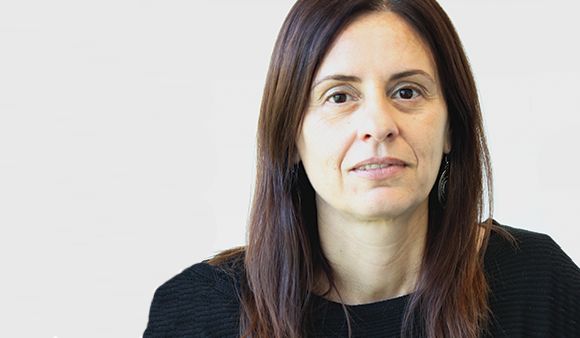Liliana Sousa is an integrated researcher at CINTESIS – Center for Health Technology and Services Research, in the AgeingC research group, at the University of Aveiro, where she is an Associate Professor with Aggregation since 2016.
She was born in 1967, in Aveiro, where she grew up and went to school until the 12th grade. She was an excellent student. Her dream was to study in Coimbra, so she chose a higher education program that did not exist in her hometown. She did her undergraduate and master’s degrees in Psychology in the Faculty of Psychology and Education Sciences of the University of Coimbra and her internship in Family Therapy and worked at the Social Action Center of the Ílhavo Council.
28 years ago, she was accepted for a position as a Trainee Assistant at the University of Aveiro, where she completed her Ph.D. in Education Sciences, developing a systemic model of collaborative intervention for children with special educational needs, parents, and teachers.
“At the time it was a very practical issue. At the University we had much more opportunity to do different things, meet different people, choose our projects,” she confesses.
She coordinated the Permanent Observatory for Social Development and held university management positions. She has taught the Health Sciences Program at the University of Aveiro and she was also Pro-Rector of that University.
“I was 41 or 42 when I accepted that position. It was very interesting. I learned that I’m not a macro performance person, although I spent many years in macro-management. It’s not really my thing. I like to work more with one person or a small group. I like ‘being with’. I’ve learned this about myself.”
As a researcher, she is part of CINTESIS, in the AgeingC group, dedicated to aging. “AgeingC has been growing, it has been gaining quality and good researchers. I feel that it had a first adaptation phase when we joined CINTESIS; and, in the last two or three years, we have been growing. I hope we can still grow more.”
As a senior researcher, she is currently participating in several projects, especially MOAI LABS: Laboratories of Collective Intelligence and Social and Health Technology, funded by the European Regional Development Fund (ERDF), under the Interreg Sudoe program. The project MOAI LABS will create an innovative methodology, the “living labs”, aiming to study the phenomenon of loneliness and social isolation of older people and, with them, explore challenges and develop digital solutions that contribute to promoting their social participation.
“This project is very interesting because it involves people who feel lonely or isolated and the big goal is to give them well-being, using digital solutions, through the “experts by experience” model. So it is developed collaboratively with these people. We expect to start meeting with these experts by experience, in May in Portugal.
Among other projects in which she participates, she highlights GrampCity, which studies the mobility of elderly people in urban neighborhoods, and Seduce 2.0, which studies the online sociability of senior citizens through information and communication technologies (ICT).
She is passionate about Gerontology, where she has found “her place,” and she says she is preparing for her own old age. “It is inevitable to think about old age when you work in this field. It transforms us and teaches us to make better use of everyday life and the people who are with us. We have a better sense of mortality, of finitude. I usually start my master’s classes in Applied Gerontology by saying that the mortality rate is still 100%. We don’t prevent people from dying. We can only make them live longer and better. Life happens. There is a certain lightness when we assume that this is so.”
1-Year Ambition
I hope to continue to work on training the students. Training is very important. People are still afraid of dependency, death, old age and all that goes with it. We have a world of people working with elderly people without having training in this area. This has effects in practice. When people have children, they get a good educator and a good teacher, but the elderly are handed over to people with no specific training. People often don’t even realize that they could do it differently. If they don’t learn, they can’t know.
10-Year Ambition
In 10 years, I hope to be almost retired or already retired. In professional terms, I think I have done everything I had to do. Until then, I will continue to be involved in this area of Gerontology and give my best contribution in adapted interventions for the elderly.
Life Beyond Research
I have a dog, Valentim, because he was adopted on Valentine’s Day. But I usually call him Tim.
I don’t have children. That’s something people don’t ask directly. My father died at the beginning of the pandemic, not of COVID-19, but of old age, a week before we confined. He died at home, with his family. My mother is 87 years old and fit. I have a small family, but one that I am very attached to.
I am a person who likes nature. I like to go hiking, hiking trails. I have been doing meditation for more than 20 years. It’s part of my daily routine, morning and evening. It’s not easy, but it works.
I guess I am a simple person.

